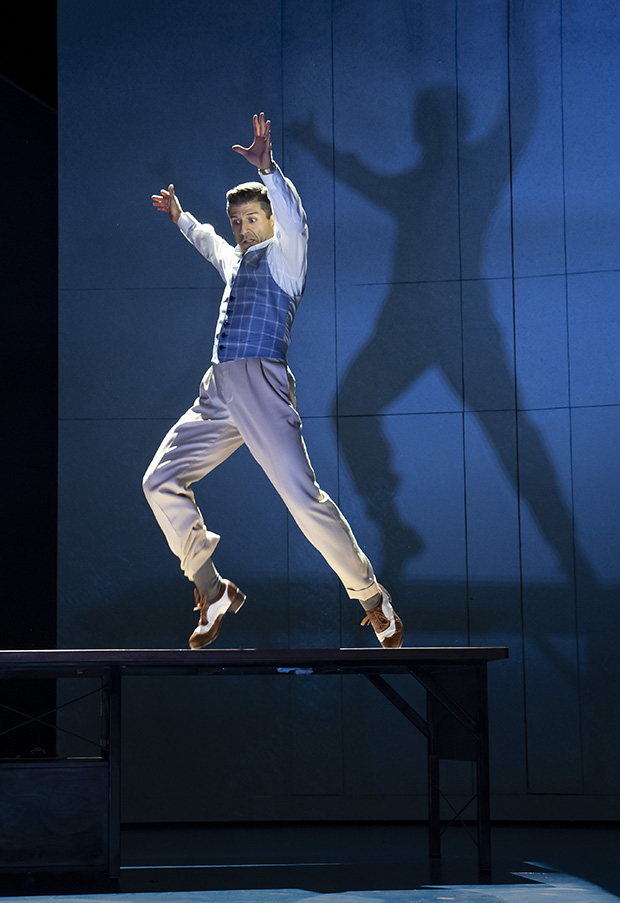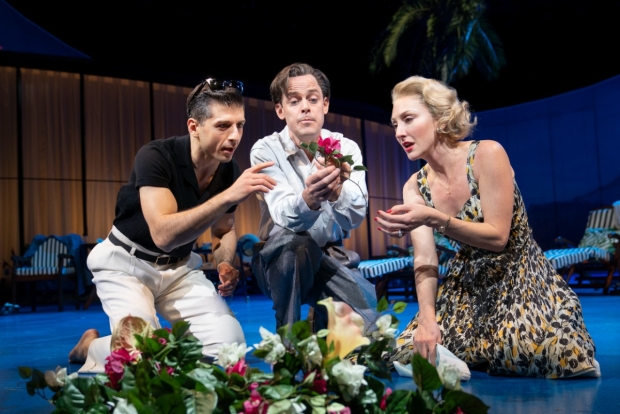Interview: Tony Yazbeck Returns to Flying Over Sunset a Changed Man
How the pandemic, a bad car accident, and more altered the Tony nominee’s outlook on life, and the ways that he’s bringing it into his performance.
Tony Yazbeck and I last spoke in 2020, during the darkest days of the pandemic shutdown. Yazbeck had been getting ready to star as Cary Grant in Flying Over Sunset at Lincoln Center Theater, but their first preview was scheduled for March 12, 2020, the day the curtain unceremoniously came down. The cast did their first public dress rehearsal the night before and hastily recorded an archival video of the show the night after; once that performance ended, Yazbeck bid farewell to his co-workers for an unknown length of time.
As we all know, it took well over a year for Broadway to start lumbering back, and now Yazbeck is once again in tech for Flying Over Sunset, previews for which finally start on Thursday. But with all that's happened — publicly and privately — it's not the same show, and for Yazbeck, it's certainly not the same performance. Here, he tells us why.

(© Joan Marcus)
This conversation has been condensed and edited for clarity.
How does it feel to be back?
That's a heavy question. It's actually been a wild ride, because we're not where we were and we'll never be back there, and that's the part that's bizarre. The first week, we were so excited we all had to take moments to breathe it in. As we went on and slowly got back into the groove of doing what we love to do, that was the part that was interesting for me. I started to feel the discipline of work, work, work, but it was different because the things that I stressed before were no longer as important. I'm picking and choosing my battles and I'm feeling a sort of grace about everything, which has really changed my life.
Has it changed the tone of the show and your performance?
It absolutely has, to the point in which I feel like I know exactly what the show is about now, whereas before I was questioning everything and doing my research and trying to almost get out of my head in order to dive into this. Coming into this process almost two years later, from whatever survival mode I was fit into, I just feel lighter than air in understanding what our show is about. It's become much simpler, and that simplicity is bringing truth to every aspect of the show. It's certainly not as profoundly deep as I was trying to imagine it to be — It's about how we connect and how we understand what is most valuable in life.
It's wild to be talking about this show that we first started discussing almost two years ago. I just saw video clips of the production the other day, which must have been shot back in March 2020.
That was the day before we were done. I look at those clips and I go, "That's a different person." It was a different angle in which I approach all my scene work now. As a dancer, I'm not pushing it that much anymore. I'm a little more myself now. I understand who I am as a dancer even more now, having gone through this hell that we've all been through.

(© Joan Marcus)
Was there a single moment of epiphany for you, or is this newfound grace something you found yourself developing over the pandemic?
There were a lot of things for me that happened through this pandemic. I sacrificed a lot of what I normally do to make sure I paid the bills on time. My wife and I were raising a kid who was never not at home, so we didn't sleep as much. It's all of those things added up.
And then at the end of May, I got into a car accident. It was a seven-car pile-up on the Saw Mill Parkway. My car was totaled. I was massively in shock. I went to the hospital. Thankfully, my family was not in the car with me and none of my bones broke, but it was a massive shock to my system, and I learned a lot about life in that moment. I was just so thankful to be alive that none of the stuff that I worried about mattered anymore.
When you take all of that and go back to work to do something you love, like putting on a play…You're not as stressed. I'm not as nervous and I'm not as worried about what people think. I don't care about critics. All I know is that I feel like I'm blessed to be alive and tell a story and see these beautiful faces around me.
How are you doing today?
I still have nerve issues and stuff in the shoulder that got pummeled in the crash. I couldn't hear anything in my left ear for some time. My fingers were numb. But all I thought was, "Thank God my son wasn't in the car." So, I'm living my life now in a way that is much less selfish. I'm living for something else. And interestingly enough, I'm starting to actually like myself more because of it.
Am I as happy? That's a different discussion — I don't know what that means because life has been so hard. But I found myself in a place that I've never been at as an actor. My inhibitions are much looser. I'm not in my head. Because what do I have to worry about? Someone thinking I'm doing something incorrectly? Who cares? As far as being an actor, that's a weird side effect and a beneficial thing.
You know, there are so many things going on in the world right now, but at the end of the day, it's all about love, and family, and striving to move our species into a better place. If you're a little more knowing of your mortality, you might be in a place to do good and be a better person. That's what I'm realizing about myself. It's not about how much money I have, or what Broadway show I'm doing. I just care about my family.
How have you taken all of that and implemented it into your performance?
I've been very emotionally connected to this character. I have a lot of parallels with Cary Grant's childhood and life, and how he made his own way. It's very easy for me to jump into that part of him. But as soon as I looked at the script again, I knew it. Some of Michelle Dorrance's choreography was still in my bones, because when choreography is great, like any quintessential Jerry Robbins or Michael Bennett, it just lives in you and you usually don't forget it. And I would find myself singing some of my songs in the shower, even a year later, almost like I was trying to conjure it.
But as human beings, we always like to look back at our past and go, "If I could do something over, how would I do it again?" What's crazy is that we're sort of doing that right now. We're living in a weird, dreamlike moment, and that's what's really exciting about this go-round. We came back that first day and did a read-through and it was almost like we got a second shot. I think that's the silver lining.








